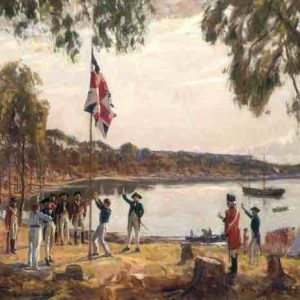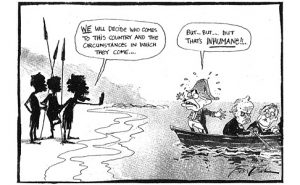By Louis A. Coutts*
An issue of profound importance as to how we characterise ourselves as Australians has gone largely unnoticed in the current political debate: the relationship between the Indigenous people and the rest of the community is in crisis.
The Indigenous community represents 3% of the population and 28% of the prison population. That is not to mention deaths in custody, the dramatic difference in health standards, a 15% negative differential in life expectancy as well as widespread social exclusion.
This state of affairs is a national disgrace and has its origins in the legal status accorded to aborigines by the Crown upon the first settlement in 1788.

When Captain Arthur Phillip arrived, it was considered by the English authorities that, according to what is called “the common law”, the land was uninhabited. That made things tricky for the local population because not one of the Indigenous population had any idea of the common law of England and, understandably, were totally unaware that they had become subject to English law the moment Captain Phillip placed the flag of the Union Jack on the soil of this country.
The fact is that the authorities knew that the land was occupied. However, the lawyers defined “unoccupied” as land occupied by people who had no laws or sovereign and who were “primitive in their social organisation”.
In fact, the justification for the fiction that English law became the law of the land to which all the unsuspecting Indigenous people were subject was declared by Lord Kingsdown in 1863 on the basis “that England had taken possession of an uninhabited barbarous country”. This justified the fiction that at 1788 this country was “terra nullius”…land belonging to no one.
It became settled law that because of the uncivilised state of the native population, the absence of laws and their “barbarous” state that the law of England became the law of this country at the moment of settlement in 1788. This approach was necessary because had it been accepted that the land was in fact “occupied” the only way that English law could prevail against local laws was by treaty in which the local population voluntary surrendered themselves to the new regime. That would have been quite a problem, given the state of affairs at the time of settlement.
Legal fiction allowed takeover
Under the legal fiction of terra nullius, the land was deemed to vest in the Crown and the unsuspecting locals were aggrieved as the invaders took over their land. Not understanding British law, things became unpleasant resulting in the Indigenous people undergoing judicial and extra judicial dispossession of their land while becoming aware of the barbarous practices of the invaders.
Things started to come to a head in 1971 when the Yolngu people of Arnhem Land objected to Nabalco taking their land for mining. They claimed they had been in possession of the land since time immemorial and thus claimed native title.
The judge in that case revisited the “uncivilised” concept of the uninhabited rule that resulted in the adoption of English law across the country. He found that, rather than the land being uncivilised and without laws in 1788, in fact at the time of settlement “there was an elaborate system highly adapted to the country in which people lived their lives which provided a stable order of society….If ever a system could be called “a government of laws and not of men”, it is that shown in the evidence before me”.
Despite this finding, Blackburn J considered that he was bound by legal precedent and found for the aluminium company.
The Indigenous population through a gentleman called Mabo, who was a Murray islander from Torres Strait, had another go at native title and persuaded a majority of the judges of the High Court that the Murray islanders did in fact have an enforceable claim to native title.
What is not commonly understood about the decision in Mabo is that, while the majority of the High Court recognised the immorality of two centuries of dispossessing the Indigenous population, the “tide of history had washed away their rights to native title”.
Only in the case where a tribe could establish that it had been continuously in occupation of the land without interruption to its laws and culture could they establish native title, otherwise, native title was extinguished.
The High Court in the Mabo case in fact closed the door to most claims to native title because “the tide of history” – which meant our arbitrary dispossession of native title – was an accomplished fact and most native titles had been extinguished. Furthermore, the High Court seemed to find, after a couple of hundred pages of obscure legal erudition by seven judges, that since settlement, the law of native title was a part of the common law firstly of England and then of Australia.
To the extent that native title survived, it was due to the operation of English law and not Aboriginal law with the result that the Indigenous population had to come as supplicants to our courts to establish their rights.
The strict juristic basis adopted by the High Court for the recognition or rejection of native title is the assumption that, miraculously, English law supplanted Indigenous laws and customs on the 26 January 1788 and it has ever been so.
‘Tide of history’ is nowhere in the black letter law
The indignant native asks the question: “Why should I have to apply to the court of the invader to establish my rights, and why are those rights determined according to laws that were inflicted upon us without our consent”. The High Court responds “because your rights and laws have been washed away with the tide of history”.
It would appear that the High Court by a majority of six to one has determined that, if the common law of England at the time of settlement in 1788 had been properly applied, England could only have acquired dominion over the laws of the natives by treaty. The inference is that our ancestors acted illegally in taking possession of the land but that is now OK because of the “tide of history”.
In reality, the argument of the tide of history is unanswerable. The terrible deed has been done. So, now, the ancestors of the dispossessed are once again forced to be supplicants to the wider majority community of non-Indigenous people by requesting their permission to be recognised in the constitution.
In the unlikely event that a referendum is successful, it will not change anything. They will only be words in the constitution. To the extent that we can set things right and wash away the “tide of history” against the Aboriginal population, we have to revisit 1788. A “misguided” woman tried to do this in 1993 in an appeal to the High Court claiming sovereignty on the part of her tribe but the High Court quickly put her in her place, affronted as they were with such a claim.
I believe that it is time to listen to the argument of the Indigenous population as it would have been presented in 1788 had they known what was going on.
In those days, if the newcomers had said to the locals: “Look we have come here and want to take over your country and make you subject to our laws” there would have been a real argument. There is some evidence that the locals would have compromised on the basis that the newcomers would have had to respect their areas of occupation and their laws and customs.

They certainly wouldn’t have agreed to subject themselves to the barbarous customs of the invaders and the way they treated some of their people. There would have been demarcation zones where the newcomers could have their laws and customs and the natives have their own.
Today, rather than be once again a supplicant to the usurper, the Indigenous population should present our Australian government with a manifesto of the conditions upon which they will continue to accept us and this could be incorporated in an Act of Parliament to be called an Act of Contrition.
Without anticipating what the Indigenous people might place in that manifesto, I can imagine that they would want, so far as possible, many of their people to be treated in accordance with tribal customs and laws. They might say:
“Having corrupted our society, you just can’t come and take our fallen brethren and lock them up in your prisons. You just can’t assume that you know how to put things right in our community and you should take notice of the Report of Rex Wild QC and Patricia Anderson in 2007 Little Children are sacred. Our laws and customs are still practised in many tribal situations in Australia and have to be respected. To the extent that you have displaced many tribes, you could help us in rebuilding those societies. Solving the awful crimes that have been committed against us, there has to be a healing process.
“We don’t want to seek your permission to be accepted. We need you to understand that we are prepared to acknowledge and accept, within limits, what you have achieved in this country provided you ask us for that concession. We want to live in harmony but we will never be able to do so while your courts insist that you had the right to take away our laws, our customs and our land”.
* Louis A Coutts LL.B (Melb) is a lawyer with a particular interest in constitutional law; an author; honorary life member of the International Commission of Jurists (Victoria), and a member of Civil Liberties Australia.

